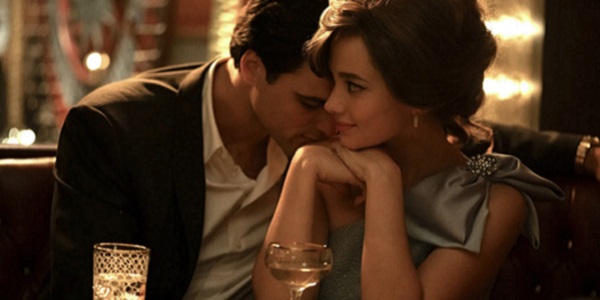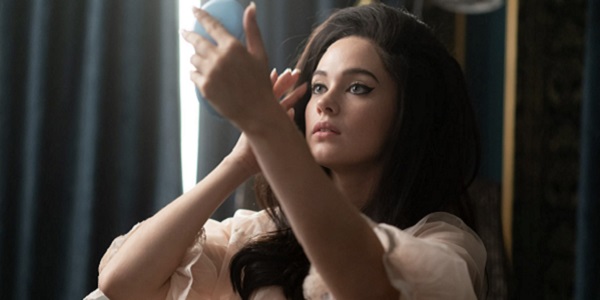New York Film Festival 2023: PRISCILLA

Lee Jutton has directed short films starring a killer toaster,…
When I was a little girl, I dreamed of living out my own Cinderella fantasy. However, it wasn’t an actual monarch that I wanted to swoop into my life and carry me off to his castle, but a pop prince—in particular, one of the Backstreet Boys. And while this version of the fantasy might be very specifically of the 1990s, the dream of falling in love with some kind of rock royalty is much more timeless. From the Beatles to BTS, The Monkees to One Direction, fans have not only idolized these stars from afar, but fantasized about somehow meeting them, winning their heart, and living out life on a pedestal where other, less fortunate fans could gaze up at them and wonder, “What does she have that I don’t?”
Priscilla Ann Beaulieu is one of the few fans to have ever turned this fantasy into a reality—but as Sofia Coppola’s gorgeous new cinematic portrait of the woman better known as Priscilla Presley shows us, being the wife of the King of Rock and Roll didn’t so much place her on a pedestal as in a cage, albeit a gilded and glamorous one. A perfect companion piece to Coppola’s magnificent Marie Antoinette, which peeled back the heavy brocade curtains of Versailles to show how a life that looks like a sugary confection can still leave you feeling empty and unsatisfied, Priscilla is an impeccably crafted and sensitively acted film that finally shines a spotlight on the woman who lived for so many years in the shadow of an iconic spouse.
Can’t Help Falling in Love
When we first meet fourteen-year-old Priscilla (Cailee Spaeny, who won the Volpi Cup for Best Actress at this year’s Venice Film Festival), she is such an idealized image of late 1950s Americana that she could have stepped right out of a Norman Rockwell painting. Clad in a sweater and skirt with a bouncy brown ponytail, she sits at the counter of a servicemen’s club in Wiesbaden, West Germany, where her Air Force officer stepfather has just been stationed, sipping a Coca-Cola while she does her homework. But when a young serviceman invites Priscilla to join him and his wife for a party at Elvis Presley’s house, this lonely teenage girl’s life is changed forever.

Elvis (Jacob Elordi), who is homesick for the U.S. and still mourning the death of his beloved mother a few months prior, is immediately drawn to Priscilla; in her pretty face, soft speech, and adoring eyes, he finds everything he has been missing. Despite her family’s initial objections to their teenage daughter getting involved with a twenty-four-year-old man who also happens to be one of the most famous singers on the planet, Priscilla and Elvis spend a great deal of time together until he returns to the U.S.—and, despite her initial belief that he’s forgotten all about her, soon he summons her to live with him at Graceland.
Needless to say, it’s hard to concentrate in class when you’ve been out partying with the equivalent of American royalty the night before. Elvis relies on amphetamines and sleeping pills to maintain his extravagant lifestyle; soon, Priscilla does too. It’s an altogether surreal life for a teenage girl to be leading, one that initially feels like a dream but all too quickly transforms into a nightmare. Elvis is hardly ever home, leaving Priscilla alone to wander aimlessly through Graceland’s empty, immaculate rooms. When he is around, he controls Priscilla’s every move, even deciding what she should wear and how she should do her hair. (When she comes home from shopping in a dress he doesn’t approve of, he harangues her until she finally explodes: “Fine, I’ll return the f*cking dress!”) And he refuses to satisfy her sexual desires, claiming it’s important for them to wait even as he selfishly seeks his own satisfaction with women like his Viva Las Vegas co-star Ann-Margret.

Every aspect of Elvis and Priscilla’s relationship bears the hallmarks of emotional and verbal abuse, and when his temper is suddenly ignited, it gets physical too. But then Elvis apologizes and tells Priscilla she’s the only girl he’s ever really loved, and the cycle begins all over again. And when you’re a young woman who hasn’t had the chance to figure out who she is on her own, it’s hard to summon the courage to leave everything and everyone that has defined your life thus far in the rearview mirror. After all, when you’ve lived your most formative years in the public eye, how do you even know who you are in private?
Don’t Be Cruel
Priscilla covers the entire fourteen-year span of Elvis and Priscilla’s turbulent relationship, from the moment they first met to the moment she finally had enough. Naturally, it’s not without sweet scenes that show why she fell in love with Elvis in the first place and why it was so hard for her to leave him. Still, even their most romantic moments together largely involve Priscilla pretending to be someone she is not; when Elvis has her dressing up in costumes for a sexy photo shoot in private, it’s not that different from him dictating that she dye her hair black and wear more eye makeup in public. Elvis never really sees her for who she really is; for him, Priscilla is little more than a lump of raw clay he can mold to his liking, the perfect stay-at-home wife who will put him above everything else in her life largely because she has nothing else.
To embody a character from their tender teenage years up through adulthood would be a challenge for any actress, especially when, as Spaeny noted when describing the shooting process at the New York Film Festival, “In the morning I’d be pregnant and after lunch I’d be fourteen years old!” Nonetheless, Spaeny is remarkable in the role, with her strong and sensitive performance as Priscilla serving as the film’s emotional anchor. Her portrayal of a young woman in the throes of abuse while still being fully in love with her abuser is rife with authenticity and pain. And when we see her later in the film, finally trying to live her own life with her own friends and hobbies, it’s like seeing a different person come to life onscreen—the real Priscilla, for the first time.

But what about Elvis? This is Priscilla’s story, not his, but even as a supporting character, he is obviously still a pivotal one. It’s not easy to portray one of the most iconic men in history as he was behind the scenes, someone flawed and fragile who felt he had no control over his career and so sought all-encompassing control in his personal life. It’s even more difficult to do so when you’re following in the footsteps of another young actor who was just nominated for an Oscar for his own portrayal. Yet Elordi’s Elvis Presley—charismatic, charming, and incredibly complicated—stands fully apart from Austin Butler’s star-making performance and deserves just as much praise. What Elordi lacks in actual physical resemblance to Elvis he makes up for with something far more important, something that Elvis also possessed: genuine star power. And, as Elordi said at the New York Film Festival, if you want to simply see an Elvis impersonator, you can go to Vegas.
As talented as the film’s two young leads are, they are aided in their portrayals of these characters by the incredibly detailed world created for them to exist in: from Tamara Deverell’s lush production design—inspired equally by William Eggleston’s famous photographs of Graceland and fictional touchstones such as Wong Kar-wai’s In the Mood for Love—to Stacey Battatt’s wonderful period costumes—I coveted every single cute dress Priscilla wore in the early 1960s—to the incredible work done by the hair and makeup team—those beehives! That eyeliner! Constructed from equal parts historical record and vivid imagination, the aesthetic of Priscilla is just as stunning and all-encompassing as the funhouse mirror vision of Versailles Coppola and her collaborators created in Marie Antoinette.
Priscilla does not feature any Elvis music; instead, Coppola’s husband Thomas Mars and his band Phoenix provide an original score alongside anachronistic versions of songs from the era, such as the Ramones covering the Ronettes. The resulting mix is not only pleasing to listen to but also keeps the focus on Priscilla instead of her more famous husband and his plethora of hits. And when Dolly Parton’s original version of “I Will Always Love You” kicks in on the soundtrack…well, I dare you not to get emotional.
Conclusion
With Priscilla, Sofia Coppola proves once again that she is the premier chronicler of what it feels like for a girl—in darkness and in light, in public and in private.
Priscilla is the Centerpiece selection at this year’s New York Film Festival.
Does content like this matter to you?
Become a Member and support film journalism. Unlock access to all of Film Inquiry`s great articles. Join a community of like-minded readers who are passionate about cinema - get access to our private members Network, give back to independent filmmakers, and more.
Lee Jutton has directed short films starring a killer toaster, a killer Christmas tree, and a not-killer leopard. Her writing has appeared in publications such as Film School Rejects, Bitch: A Feminist Response to Pop Culture, Bitch Flicks, TV Fanatic, and Just Press Play. When not watching, making, or writing about films, she can usually be found on Twitter obsessing over soccer, BTS, and her cat.













